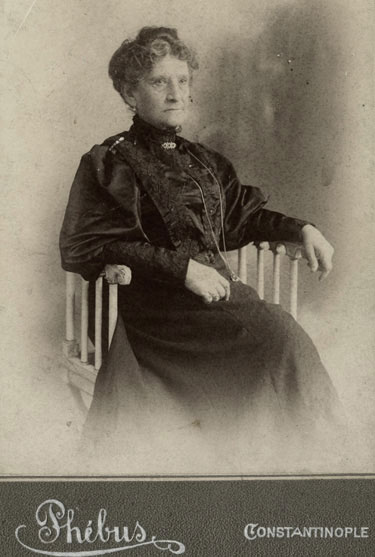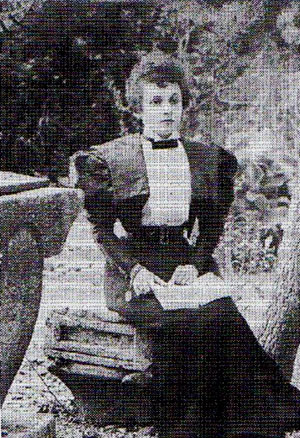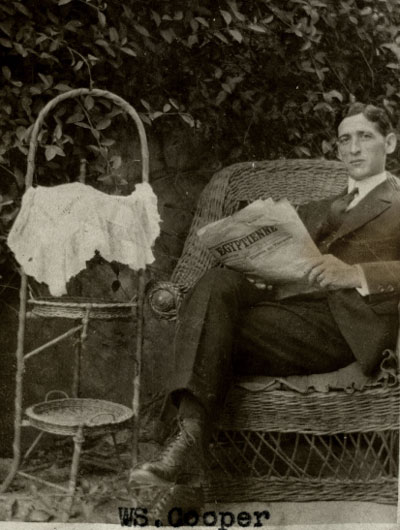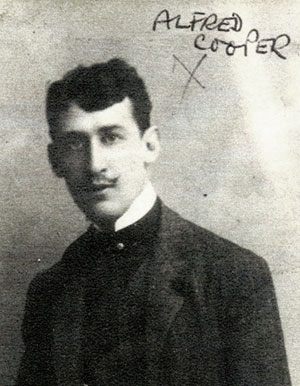The Story Cooper / Lombardo / Faraon families of the Levant by Jeanne Glennon LeComte, 2011 |
|
The English genealogist and author Richard Austin-Cooper reveals a historical retrospective of life for an international family united during their time in the Levant in his book Butterhill and Beyond. Cooper is allowing a chapter from his book that details his ancestors experience to be shared on this site.
In Cooper’s book it’s evident that the international community present in the Levantine region during the mid to late 1800’s is clearly exemplified in the family tree of John Thomas Adolphus Cooper and Adelaide Lombardo Cooper. The couple met and married in Monastir, they lived in Scutari, Smyrna, Salonika and Adrianople, they had 7 children, 2 died in childhood. Of the five surviving children, four married and remained in Europe and the Middle East except for one who headed to the U.S. in 1901.
While Richard Austin Cooper traces his English ancestors back to the 16th century, John Thomas Adolphus Cooper (b. 1836) was the only member of his family to leave England and head for the Levant. While J. T. A. Cooper was a newcomer to the region, his wife’s family had already been living in the area for decades.
Adelaide Lombardo Cooper was born to Mario Lombardo, of Catania, Italy and Assunta Mananizza Lombardo, of Elba, Italy. Assunta and Mario Lombardo raised 6 children in the Levant. Thanks to the effort of genealogist Jacques Caporal, we know that the Lombardo family is listed in the “Kingdom of Naples and Sicily” registry in Constantinople; various years are cited in the registry beginning in the early 1800’s. Many of the children of Mario and Assunta married other Levantines, some remained in the area, others returned to their European homelands to raise families of their own.
The children of Assumpta Mananizza Lombardo and Mario Lombardo include: Rosario Lombardo, Paul Lombardo (b. 1824) Rosalinda Lombardo (b. 1829) Eugenie Lombardo (b. 1832) Guilia Mathilde Lombardo (1831-1901) and Caroline Ersilia Lombardo (1846).
Family names branching out from the tree of Assunta Mananizza Lombardo and Mario Lombardo include: Loir, Alberto, Marchesi, Miglievitch, Acquarone, Faraon, Cooper, Raytinski, Papillault, Fauvel, DiGiovanni, Polski, Canino and Satriano.
Below is a picture courtesy of Jacques Caporal, showing the Lombardo family listed in the registry ‘Kingdom of Naples and Sicily’.
 |
|
|
||
Rosario Lombardo Miglievitch (b. 1829). |
Adelaide Lombardo Cooper (b. 1835). |
During his research, Richard Austin-Cooper uncovered vivid details surrounding the lives of his great-grandparents, J. T. Adolphus Cooper and Adelaide Lombardo Cooper, documenting what life was like as active members of the international community in the Levantine in the late 1800’s. In Butterhill and Beyond, the chapter of family history that provides details of what life was like for the Cooper family in the Levantine lies in the chapter “VI European Venture”. With the author’s approval and encouragement a substantial portion of the chapter is transcribed below:
Richard Austin-Cooper, “VI European Venture”
At Age 23 we find young J.T. Adolphus working in Smyrna for the Levant Submarine Telegraph Company. He left England sometime between 1854 and 1859 for Turkey. In a Letter to his 19 year old sister Clementine in England dated 31st May 1859, Adolphe says:
My Dear Clementine,
I was indeed glad to receive your letter it is now really long since we either saw ourselves or corresponded together. I am far far away now and the only mention (?) I can get is to write and receive letters from those I love. I have traveled a good deal now and have seen a food deal of the World and and getting more and more sick of it. I am cast in the middle of one of the oldest places in Europe and I find the people in the Levant in general so interested, hypocritical in all they so that I cannot but regret our acquaintance of more Northern Climes. However I don’t mean to say that I am not well here, on the contrary, as far as health goes Thank God I am in perfect health. Although it is here so very hot that from 10 till 5 no one can stir from their houses. The sun is really burning and strange I can stand the heat better than the natives. When I have my duties I go out in the promenade when all the pretty Greek girls are to be seen and lots of them are too…I am better known even than most of the young men born in the place but the reason is that they tend to think more of a stranger than they do of themselves. I went to several large balls given on purpose for me, you know I am the Director here and there for stand at the Head of Society. But I go out boating sometimes and donkeys, horses etc. The Mediterranean is really splendid now, the water is as smooth as a looking glass.
We have lots of young vegetables and fruit already, cherries in abundance……(he goes on to talk about family members in England etc. then closes with …)
I am afraid I will not be able to see you for some time to come.
Adieu, let me request of you to observe your religion with all possible severity and pay the greatest attention to all which those who are older and more experienced than you may say. God has put you in good hands try and be worthy of the favor.
Yr. Aff. Bro. Adolphe
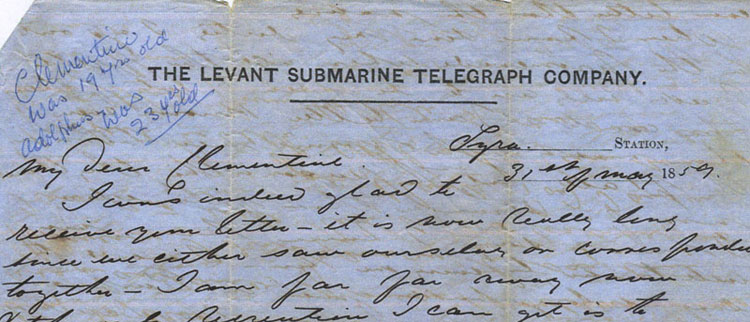 |
Posterity does not record Clementine’s thoughts on receiving this stuffy letter from her 23 year old brother. We do know that she and (her sister) Hetty ended their days as spinsters at 8 Culmore Road, Peckham St. London, having cared for their father Sam Cooper up to the date of his death in 1874 at age 72. A further five years and the pretty Greek girls, mentioned in Adolphe’s letter to his sister have obviously changed to pretty Italian girls or girl rather, since it was on the 8th of August 1864 that ‘Adolphus John Thomas Cooper (as he appears on his marriage certificate), ‘Bachelor, a Telegraph Engineer resident in the Town of Monastir, given as the son of Samuel Henry Cooper a: ‘Landed Proprietor’, married Adele Lombardo a ‘21 year old Spinster, daughter of Marius Lombardo deceased’. The Marriage Certificate was signed ‘Adolphus Cooper and Adele Lombardo’ in the presence of the British Consul, Charles J. Calvert ‘no Church, no License’, whilst the Witnesses, with a motley collection of names, were- H. Mitrowo, A. H. Andre, Christopher Stober and S. C. Damianovitch.
The British Consulate General in Istanbul advised me, in 1958, that according to their records, John Thomas Adolphus Cooper, son of William Samuel (sic) was registered at that Consulate in the years 1871, 1872 and 1886 with his wife Goodfor Adelaide (I have never discovered where Miss Lombardo go the ‘Goodfor’ from!) and children Arthur, Richard, Ida, Henrietta, Alfred and William, born approximately in 1866, 1868, (or 1870), 1870, 1873, 1875 and 1886 respectively. Our records do not show (he says), where these children were born but it is possible that the family was in Salonika between the years 1873 and 1885, as it was only registered here in 1886 upon production of Salonika registration Certificate No. 90/1885.
In fact, Arthur was b. 3.7.1866 in Salonika, Richard in 1868, Ida on 19.1.1870 in Scutari, Albania and Henrietta and Alfred were both born in Salonika on 21.8.1872 and 4.9.1874 respectively, whilst William also was born there on 14.4.1886. Their father, Adolphe, is shown on the Birth Certificates variously as ‘Superintendant of the Ottoman Govt. Telegraph Station at Scutari’, in 1870, and as ‘Imperial Commissioner to the Ottoman Railway, Salonika’ in 1872 and 1874.
Adolphus was highly thought of in the ‘Sublime Porte’ as the Ottoman Capital was known and progressed in his profession. His success in aiding the modernization of Turkey is evidenced by a number of awards made to him by the Sultan and others during the period 1876 up to his death in 1897.
These awards included-in 1876, the order of the Medjidie 4th Class, presented by the Sultan Abdul Hamid II. On 29th July, 1884 a knighthood from Pope Leo XIII in the Order of Pius IX, whilst in 1897 he received both the Order of the Osmanieh from the Sultan Abdul Hamid and the People’s Order for Civil Service Commanders Cross 3rd Class, from King Ferdinand of Bulgaria. The latter award is evidenced by a certificate which reads as follows:
WE FERDINAND 1ST
BY THE GRACE OF GOD AND THE WILL OF THE PEOPLE
KING OF BULGARIA
IN TOKEN OF OUR PARTICULAR BENEVOLENCE
WE DECORATE
COOPER EFFENDI (ADOLPH COOPER)
INSPECTOR OF THE ESTER RAILWAYS IN ODRIN
WITH OUR
PEOPLE’S PRDER FOR CIVIL SERVICE
THE COMMANDER’S CROSS 3rd CLASS
WE DECREE THE PRESENT DEED AFFIXED WITH THE
SEAL, TO BE GIVEN TO HIM
EVKSINOGRAD, 20th SEPTEMBER, 1897
CHANCELLOR OF THE BULGARIAN ORDERS.
It is clear that Adolphe Cooper was also the Secretary of the sub-committee for the Red Cross in Salonika, although the records of that Society do not give any insight into his activities on his activities on their behalf other than the contents of a letter from Constantinople date April 1879 as follows-
Comite Central de la soc du Croissant Rouge, Constantinople to Mr. A. Cooper, Secretary of the sub-committee of the red Cross in Salonika 21.4.1879
The Central Committee of the Red Cross in its Meeting of 19th of April, has awarded you its Diploma of Honour in Recognizance of the services mentioned, which you have rendered to the cause of the sick and wounded Ottoman soldiers.
In according you this evidence of its deep gratitude, our Society can only acquit you itself inadequately for the debt it owes you, in the name of the numerous victims whom you have aided so effectively.
Please accept our best wishes,
THE PRESIDENT
(The following are excerpts taken from Butterhill and Beyond written by Richard Austin-Cooper; Below are segments from a letter written on March 10th, 1891 by Adolphe to his 51 year old sister Clementine in Peckham):
My Dear Clementine,
….the Wedding came off in a grand style all the Constantinople papers spoke about it. There were about a hundred guests and it took place in the home by special permission from the Pope’s nuncio, this is on account of Adelaide’s sudden severe illness. (She’s quite well now). Seventy persons sat down to supper at two in the morning and all remained ‘’til 5 in the morning. Ida went off the same day by train to Constantinople, she received some nice presents. The whole affair cost nearly 300, I owe a good deal of this money which I am to pay in the course of three years it is rather hard for me, what can I do. I gave her, in Henrietta’s name, Papa’s picture. They live with us, we gave them a room and they pay us 100 a year… Arthur has a food position now. He gets now 6 per month. He’s not with us, he is in Constantinople. I have Alfred who has just been appointed in the Turkish Post and Telegraph Service. He’s seventeen and then I have Willy, a fine and intelligent little fellow who is now six. …..
Goodbye to all at home. Wish them to be kindly remembered to you, your affectionate brother.
Adolphe.
My great aunt’s wedding was reported in the Levant Herald of 26th January 1891 in the following words:
FASHIONABLE WEDDING AT ADRIANOPLE
A correspondent sends from Adrianople some of the particulars of the marriage of Miss Cooper, eldest daughter of Cooper Effendi, Imperial commission at the Oriental Railways, with M. Ratynski inspector of the Public Debt at Adrianople, which took place on Sunday last. The wedding was a brilliant one. On the previous evening all the Turkish ladies of the upper society of Adrianople called upon the bride to present her the usual compliments. On the following day, the religious ceremony took place in the residence of the father of the bride, the weak state of the health of Mme. Cooper not permitting her to attend her daughter’s marriage at the Church, A special authorization had been obtained from Mgr. Bonetti, the delegate of the Holy See in Constantinople. At three p.m. the house was filled with guests. The Governor General, his Excellency Izzet Pasha, was represented by Fehmi Bey, President of the Court of Appeal; and the commander of the 2nd army corps, Marshal Weissel pasha, by his son in law, Colonel Mohikliss Bey… There were also present: Their Excellencies Khairi Pash, chief of the Staff; and Hakkı Pasha, director of the fortification works; Mr. Graves, the British Consul at Philipopolis, and acting consulat Adrianople; the defterdar of the Vilayet Province; Reouf Bey, Secretary general of the Vilayet; M. Weisor, inspector of the Oriental Railways; Mr. Reade, sub-director of the Imperial Ottoman Ban; Shefki Bey, Director of Justice; Demetrakopoulo Effendi, nazir of the Regie; Shefki Bey and several friends from Constantinople and Dedeaghatch. At the conclusion of the religious ceremony, the guests separated, to meet again at 9 pm for a dancing party and supper, Dancing was kept up until 5 a.m. The young couple left on the same evening for Constantinople where they will make a stay of about ten days.
Two months later, in a letter to his sister Clementine, Adolphe wrote-
Adrianople, April 6th 1891
My Dear Clementine,
I hope you are not angry with me on account of my silence. I have been worried and busy for a long time. I here enclose Henrietta’s photograph. It is very like her indeed. We hope she will get married in August or September next. Her fiancé has just been promoted to the rank of sous-inspector of the Imperial Bank (Ottoman) with a salary of 400. Ida and Henrietta are both very lucky.
Josef (Ratinsky) has just been promoted to the rank of Inspector of the Public Dept Department with a similar salary…. Unfortunately Ida’s husband (Ratinsky) has been named to go to Erzeroum in Asia, a nasty and cold climate and we are not at all happy as Ida cannot stand the cold and there the winter is awfully long (nine months).
Her husband leaves for his post in fifteen days and Ida will join him in the summer. They are both in Constantinople now and will be here for Easter….
The Sultan has just decorated me with the 4th Class of the Order of the Osmanieh. All the papers talked about it.
Goodbye, all write in kind love, your affectionate brother
Adolphus.
Below are segments from a letter Adolphe writes to his son Arthur from the Hotel Luxembourg, Pera, dated the 1st of August 1897):
My Dear Arthur,
You will see that I am in Pera. Ida, and her child Willy, and myself we arrived here last Thursday morning. Unfortunately Edwin (another child of Ida’s) was unwell before we left and on our arrival here he got worse, since…. He has had an attack of dysentery with fever, this could easily have lead to typhoid of which there is a good deal in Adrianople, we miss you very much indeed and our Raki Kef parties are dull without you…. I came to this hotel and I am very pleased with it. You ask me to send you Alfred (Adolphe’s other son) I cannot do this as he is not so well and I will never part with him in such a condition. Thank you all for your kind offer.
At last Faraon (daughter Henriette’s husband) has got his appointment as Controlleur Adjoint Commercial with Lt. 30 a month but I am afraid they will send him to Salonika…. Mamma is suffering very much from her kidneys. Unfortunately there is nothing to be done. I intend to remain here another week and then return to Adrianople. Goodbye, give my love to your wide and kisses to the children. Your affectionate father Ad. Cooper.
(The following are excerpts taken from Butterhill and Beyond written by Richard Austin-Cooper; below are segments from a letter written just nine weeks before Adolphe died):
Adrianople Sept, 9th 1897
My Dear Arthur,
Your last letter is duly to hand. You seem to complain of my silence. In the first place I am not very well, in the second your Mother continues to suffer awfully from her kidneys, and then I am sorry to say that poor Alfred who is now in Pera with his two sisters has had a return of his blood spitting and I am now under the impression that he will not get over it. Besides all this, my expenses have reached such a pitch that you may well understand that I cannot always be in a happy mood. Willy’s school will now cost me from 45 to 50 pounds annually. On the other hand they have cut me down to 24 pounds.
We are glad to hear that your wife and children are well…. The place they are in is recognized as one of the healthiest in the East. I leave this for Pera tomorrow night to put Willy to school - the parting with him makes me most unhappy. He will be half boarder for the first year and will live with Henrietta.
We all join in best love (that is to say Mama, Willy and myself) the others are all in Pera.
Your affectionate father Ad. Cooper. (End of text courtesy of Butterhill and Beyond).
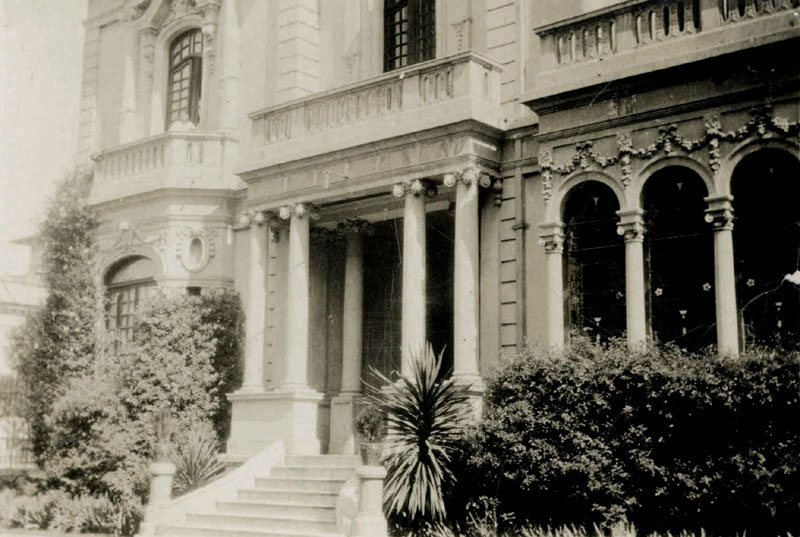 |
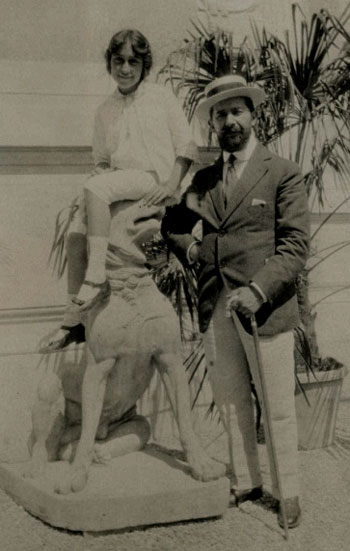 |
John Thomas Adolphus Cooper died in Istanbul on November 14th 1897, and his wife Adele remained registered with the Consulate there for the years 1899, 1900 and 1902 with her son William. According to his daughter Henriette, Cooper was recognized by the Pope for his efforts in determining where railway stops would be built throughout the Levantine region. Many of the sites chosen by Cooper were either in or near towns where a high concentration of Catholics lived.
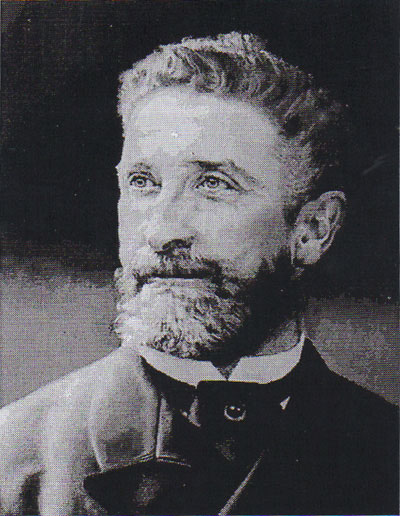 |
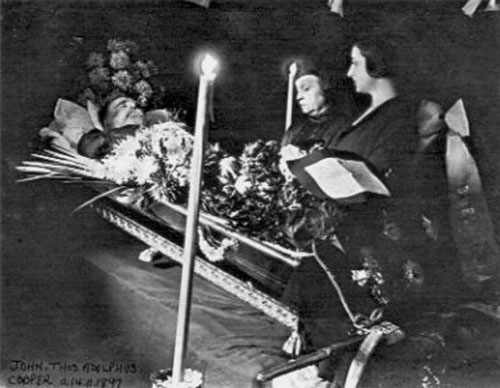 |
Five years after the death of Adolphe, Adele went to live with her daughter Ida and Ida’s family in Beirut where Adele Lombardo Cooper died in 1912.
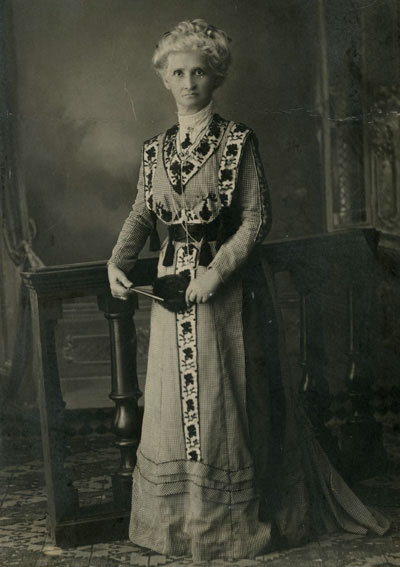 |
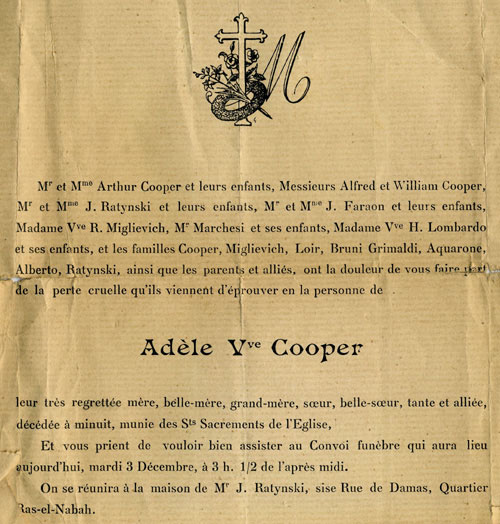 |
The following are summaries briefly describing the children of Adolphe and Adele Cooper. Two of their children died young.
1. Arthur Cooper’s wife had a rather dramatic affair that ended her first marriage, leaving her husband with three young children. A legal document was drawn up detailing how Arthur challenged his wife’s paramour to a duel.
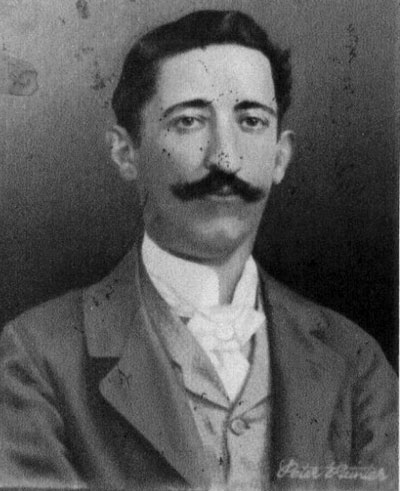 |
From Butterhill and Beyond~ “Monsieur A. Bonnel et A. Russo s etant presents a Monsiuer L. de Wroblewski, pour demander au nom de leur ami et client Monsiuer A. Cooper, satisfaction par les armes pour offences graves. Monsieur P. Loressi et A. Scheggi, charges de le representer pour chacun des adversaries …. ont pose les conditions suirvantes: Arme, le pistolet de combat, distance 25 pas avec faculte d’ avance 5 pas pour chacun des adversaries echarge de 2 balles chacun, tir a volonte”. [Mr A. Bonnel and A. Russo being present have Monsiuer L. of Wroblewski, to ask in the name of their friend and customer Monsiuer A. Cooper, satisfaction by the weapons for serious offences. Mr P. Loressi and A. Scheggi, loads to represent it for each adversaries…. installation in the following conditions: Arms, the combat gun, outdistances in advance 25 paces with the allowance of 5 paces for each adversaries to exchage of 2 balls each, shooting at will].
According to Richard Austin Cooper, grandson of Arthur Cooper, the duel never took place, Wroblewski fled the country, with Arthur’s soon to be ex-wife, whom he later married. Arthur also married again and held a number of positions with established companies throughout the Levant region finally settling in Messina where he died in October, 1929.
(Of Arthur Cooper’s children, it is Richard, later known as Captain Dick Cooper, who lead a life filled with adventure. As a toddler, Dick Cooper was kidnapped and held for ransom by Bedouin tribesmen. Cooper’s astonishing military career began when he was just 15, he was recognized for his bravery in battle receiving the Croix de Guerre. Captain Dick Cooper wrote numerous books about his life as have both his children. For more extensive information regarding his remarkable life please go to www.captaindickcooper.com)
2. Ida Cooper Ratynski remained in Beirut as a linguist, it is said that 5 languages were spoken in the Cooper home when the children were growing up. Ida raised two of her own grandchildren (children of Wladislas Ratynski and Claudette Barbier Ratynski) after their mother died in childbirth. Two of Ida’s sons never married and remained in Beirut until their deaths. Her other children, Edwin and Adelaide Ratynski married their prospective spouses and settled in France and have descendants living throughout France today.
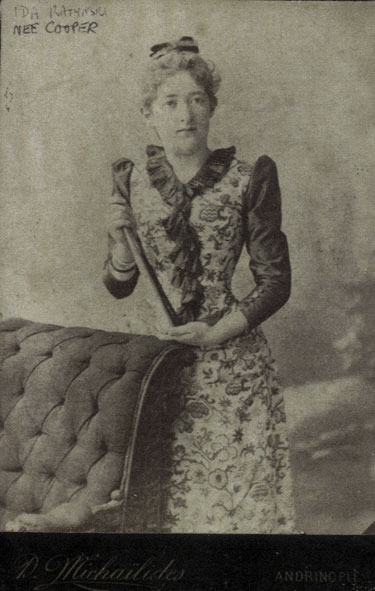 |
3. Henriette Cooper Faraon (1872-1822) Henriette and her husband Joseph Faraon, moved their family from Pera to New York City. Joseph to managed a U.S. division of a British tobacco exporting business. Henriette died in 1922 and her husband died in 1927. In 2009, a great granddaughter of Henriette’s contacted the grandson of Alfred Cooper, Richard Austin-Cooper, through ancestry.com. Henriette’s husband, Joseph Faraon (1865-1927) was the son of Pierre Faraon and Meropi Cocchino. Pierre Faraon worked for a French newspaper in Constantinople. Joseph’s mother died during childbirth during in the midst of a cholera epidemic. Pierre remarried and had more children with his second wife. Joseph was sent to live with his aunt and uncle Anthony and Alexandra Faraon. Joseph spent his teenage years in a Jesuit boarding school outside Constantinople. Joseph Faraon explained to his children that the Faraon family was originally from Egypt and made their way to France then the Levant and at some point, changing the spelling of their surname from Pharaon to Faraon.
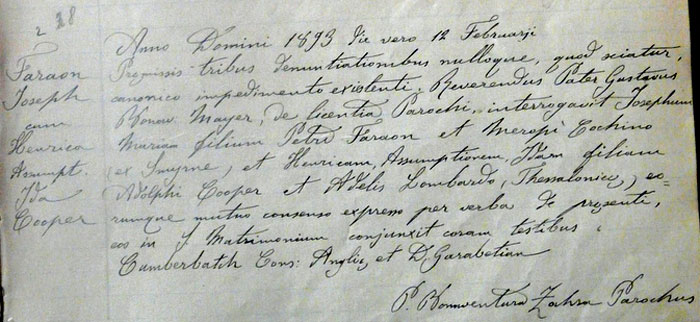 |
My great-grandfather Joseph P. Faraon and his wife, Henriette Cooper Faraon, were the only members of her family who left the region for the U.S. When he left Constantinople in 1901 he was sent to open up a ‘branch office’ in New York City. I do not know if the ‘parent’ company based in Turkey had the same name or a different name. Joseph Faraon made numerous trips back to the region, including Odessa, to purchase tobacco and import it to the U.S. on behalf of the Turco American Tobacco Co.
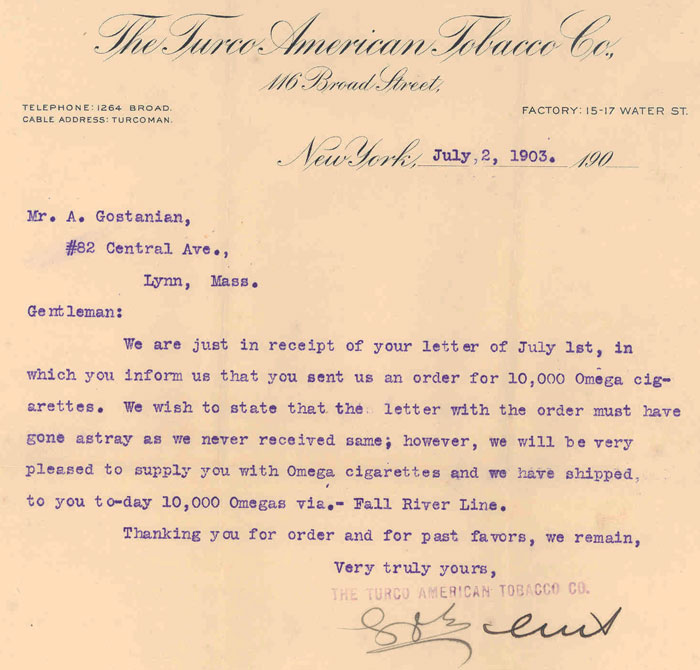 |
4. and 5. Alfred and William Cooper never married, they died in 1923 and 1941 respectively.
|
|
||
William Cooper 1886-1941 |
Alfred Cooper 1874-1923 |

